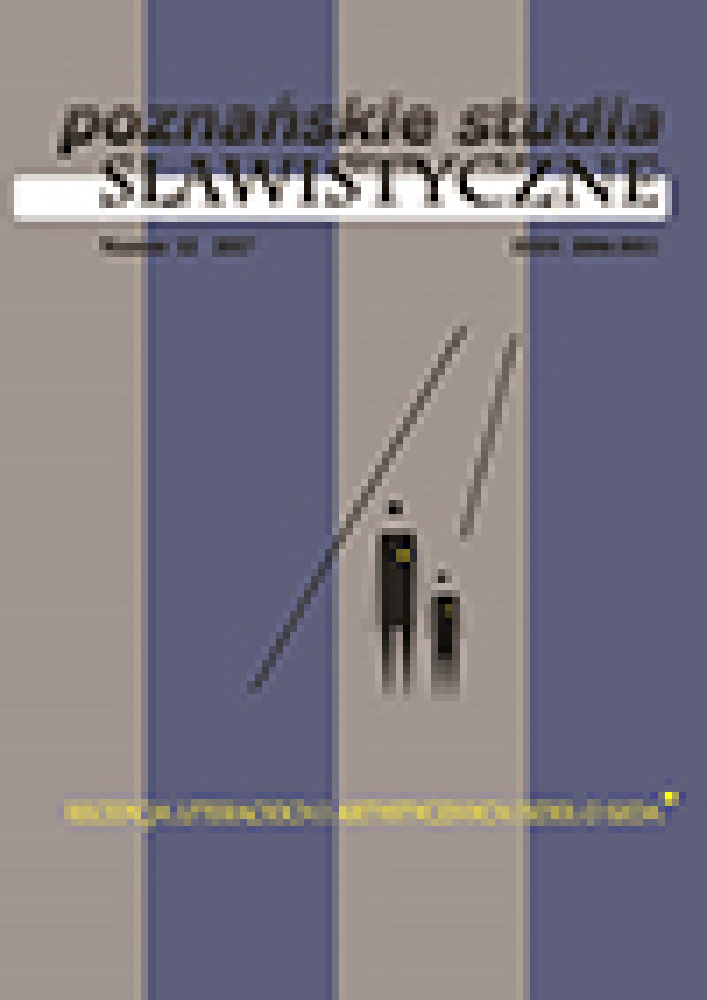Abstract
The article discusses several Slovak plays with the theme of the Holocaust; namely Ticho (Silence) by Juraj Váh, Holokaust (Holocaust) by Viliam Klimáček, and Rabínka (The Woman Rabbi) by Anna Grusková. It also briefly refers to Návrat do života (Return to Life) and Antigona a tí druhí (Antigone and Those Others) by Peter Karvaš, both mediating traumas from concentration camps. Two plays (Ticho and Návrat do života) were written and staged immediately after the Second World War. Karvaš’s Antigona is a rare occurrence of the theme in Slovak drama during the Communism (in the early 1960s), whereas Klimáček’s and Grusková’s plays are recent, both staged in 2012. The article focuses on several aspects of these five plays: on dramatic characters representing “victims”, “witnesses” and “culprits” (Panas, quoted in Gawliński 2007: 19); on references about and/or representation of the Holocaust in dramatic texts; and on the type of the conflict(s) in the plays. It also mentions specific approaches of respective authors when dealing with the theme of the Holocaust, as well as with the relevance of their reflection of the theme for Slovak society in respective periods.References
Dedinský M.M., 1962, Antigona a tí druhí na popredných scénach ČSSR, “Film a divadlo” 22 March 1962, pp. 3–4 (Archives of the Theatre Institute in Bratislava, folder Karvaš: Antigona, 1962).
Gawliński S., 2007, The Discourse of the Holocaust. Problems of the Literary Communication, in: Holokaust – Šoa – Zagłada v české, slovenské a polské literatuře, ed. J. Holý, Praha, pp. 19–27. Grusková A., 2008,
Rabínka, in: A. Grusková, Dráma 2006, Bratislava, pp. 61–81.
Grusková A., 2012, Rabínka [a new version of the play], in: Bulletin of the performance, premiere in the Slovak National Theatre on 3 March 2012 (Archives of the Theatre Institute in Bratislava, folder Grusková: Rabínka, 2012).
Hirš P., 1962, Polemika Antigony a polemika o Antigone (Archives of the Theatre Institute in Bratislava, folder Karvaš: Antigona, 1962).
Karvaš P., 1962, Antigona a tí druhí, Bratislava.
Karvaš P., 1949: Návrat do života, Turčiansky Sv. Martin: Matica slovenská, Javisko, Vol. 26.
Karvaš P., 1959, Návrat do života, Bratislava. keb, 1949, Pôvodná slovenská hra na NSND, “Obrana ľudu” Vol. 5, No 127, 01.06., p. 5.
Klimáček V., 2015, Holokaust, in: 13 hier, Bratislava, pp. 395–455.
Kollárová L., 2012, Rabínka v SND spláca historický dlh, , 05.03.2012 (printed copy in the archives of the Theatre Institute in Bratislava, folder Grusková: Rabínka, 2012).
Kročanová D. (ed.), 2014, Výkrik. Voľba. Vojnová a povstalecká téma v slovenskej dráme 20. Storočia, Vol. 2, Bratislava.
Pavlac P., 2013, Viliam Klimáček: Holokaust, in: Divadelná Nitra 2013 (Bulletin of a festival), pp. 55–56 (Archives of the Theatre Institute in Bratislava, folder Viliam Klimáček: Holokaust, 2012).
Robertsová D., 2005, Návraty, križovatky a cesty: Holocaust v slovenskej dráme v období 1945–49, “Slovenské divadlo” Vol. 53, No. 4, pp. 344–355.
Rozner J., 1949, Debut ďalšieho slovenského dramatika, “Pravda” Vol. 30, 01.06., p. 4.
Smrčok Ľ., 1949, Ticho – zrkadlo doby, in: Bulletin of the performance, premiere 18.05., pp. 96–97 (Archives of the Theatre Institute in Bratislava, folder Váh: Ticho, 1949).
Štefko V., 2011, Dejiny slovenskej drámy 20. storočia, Bratislava.
Váh J., 1948, Ticho, Bratislava. Vrba F., 1962, Ještě jednou Antigona, “Literární noviny”, 24.03. (Archives of the Theatre Institute in Bratislava, folder Karvaš: Antigona, 1962).
Wild J., 2015, Nič než slová? Iný Klimáček, in: V. Klimáček, 13 hier, Bratislava, pp. 459–488 (an extended version of the article was published in: “Svět a divadlo” Vol. 24, No. 3, 2013, pp. 73–84).
License

This work is licensed under a Creative Commons Attribution-NoDerivatives 4.0 International License.
